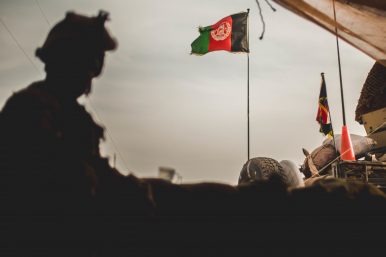By Wahidullah Azizi
As the country slides deeper into trouble, many view Afghanistan’s enormous natural wealth as the way out of the somber economic and security situation. The country has a wide range of minerals, from rare-earth elements to abundant iron ore and copper deposits, lithium, gold, and more — prized possessions in any modern-day economy. While the mineral deposits could be a potential window to a bright future for the Afghan people, they do not always lead to a happy ending.
In addition to a relentless insurgency that has been raging for more than 17 years, endemic corruption is a bane for the impoverished landlocked country. On the 2017 Corruption Perception Index, Afghanistan ranked 177th out of 180 countries and territories — a significant decline over the previous year. Another survey puts the amount of bribes paid by Afghans annually to access basic public services at a staggering $3 billion, when the country’s entire security budget sits at a little more than $5 billion.
On October 5, the government awarded two major copper and gold exploration contracts to Centar Ltd, a company founded by Ian Hannam, a former chairman at JP Morgan. The firm claims investors from several nations, including the United States. The British company will be digging for gold in Badakhshan and copper in Sar-i-Pul, both provinces located in northern Afghanistan. The signing ceremony at the Afghan embassy in Washington, D.C. was attended by the ministers of finance and mining and petroleum.
While investments in the mining sector are welcome, signing the two contracts may violate relevant Afghan laws. A former National Unity Government (NUG) cabinet member, who resigned in June 2018, owns shares in both contracts. As per the country’s mining law, senior government officials including the president, deputies, and ministers cannot obtain a mining contract before a cooling off period of five years. Also, in contrast to the law, which requires companies to provide necessary financial guarantees, the company was given a six-month time period after awarding the contracts to do so. The alleged conflict of interest, lack of financial guarantee, and violation of Afghan law are major concerns. Watchdogs and civil society organizations fear the agreements will do more harm than good to the people.
Both sites, located in insecure areas, are not ripe for extraction at the moment. Even if mining begins, the government may not be in a position to effectively monitor implementation of the contracts. Recently, provinces in the north have seen a steady deterioration of security, with rebels increasingly challenging the security forces.
Badakhshan, an important northern province that has never come under Taliban’s control, even when they were in power in the 1990s, is now emerging as an insurgent hotspot — posing a serious threat to the local government. The mineral riches of the province are a principal reason for the mushrooming growth of the Taliban and other armed groups in Badakhshan.
Security risks aside, Afghanistan is not yet ready to award major mineral contracts. The mining sector is still without an adequate legal framework and the organizational capacity to oversee such deals. This includes the new mining law, which lacks transparency, largely because of an ambiguous and often confusing process that starts with bids and monitoring of the extraction process after the award of contracts.
One such example is the Qara Zaghan gold mine in Baghlan, which was exploited with little oversight from the government. There are allegations that the contractor extracted gold but the government received little or nothing in return. The long-stalled Aynak copper ore mine contract granted to a Chinese company has been the subject of debate and lately a cultural disaster with the discovery of Buddhist heritage in the site.
Reaching Afghanistan’s mineral deposits form a part of the argument behind notorious contractor Erik Prince’s push for a privatization of the war. Prince, who founded the infamous company formerly known as Blackwater, recently shuttled between Kabul and Washington to meet with politicians and powerbrokers in a renewed effort to sell his idea of privatizing the ongoing Afghan conflict. The real losers would be the Afghan public, who are already paying in blood every day for what has become the United States’ longest war. The war has been even longer for the Afghan nation.
Be it water, hydrocarbons, hardwood, or minerals, Afghanistan’s only hope for a bright future lies under its blood-soaked earth. Much of the country’s hope hinges on its natural resources. The Afghan government should move cautiously to make sure mineral exploitation activity does not simply fuel the current conflict.
Wahidullah Azizi works for Integrity Watch Afghanistan.

No comments:
Post a Comment